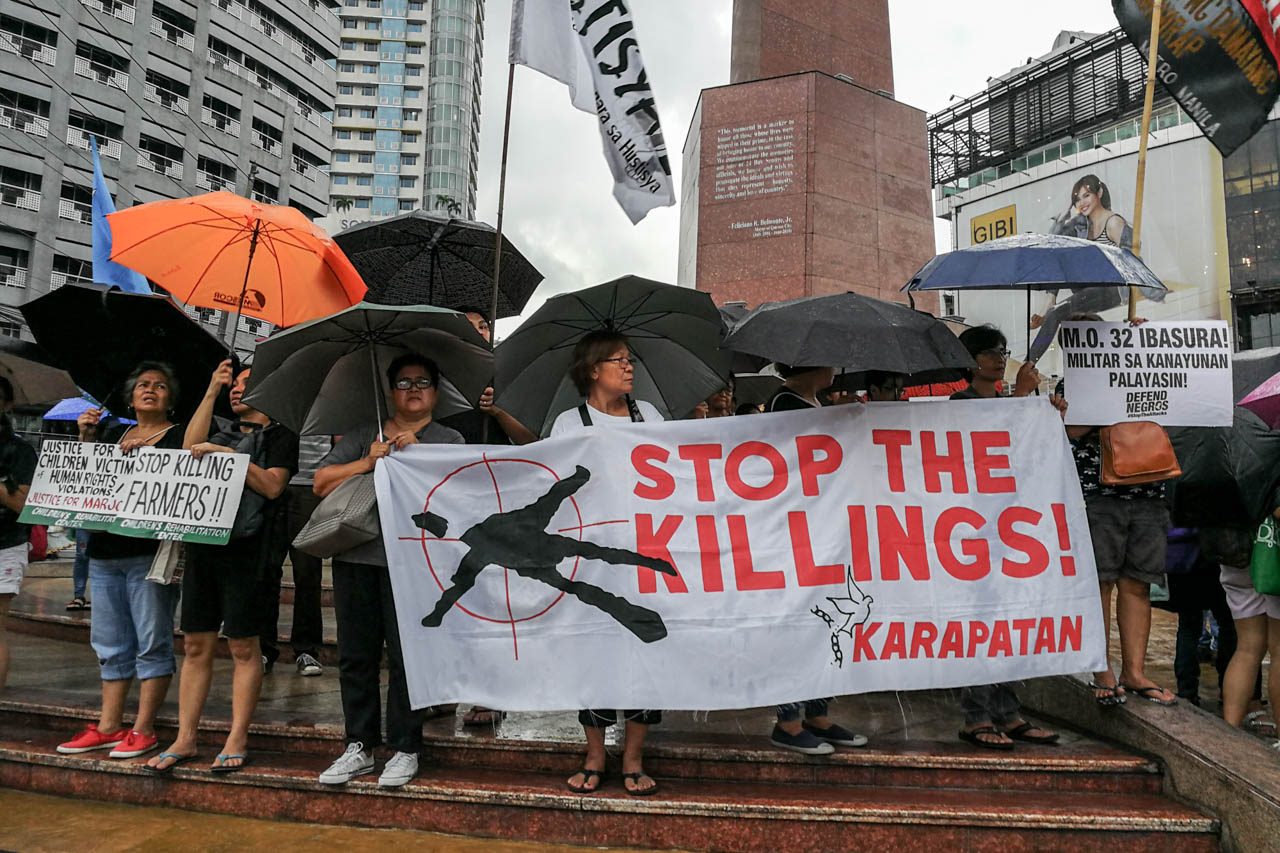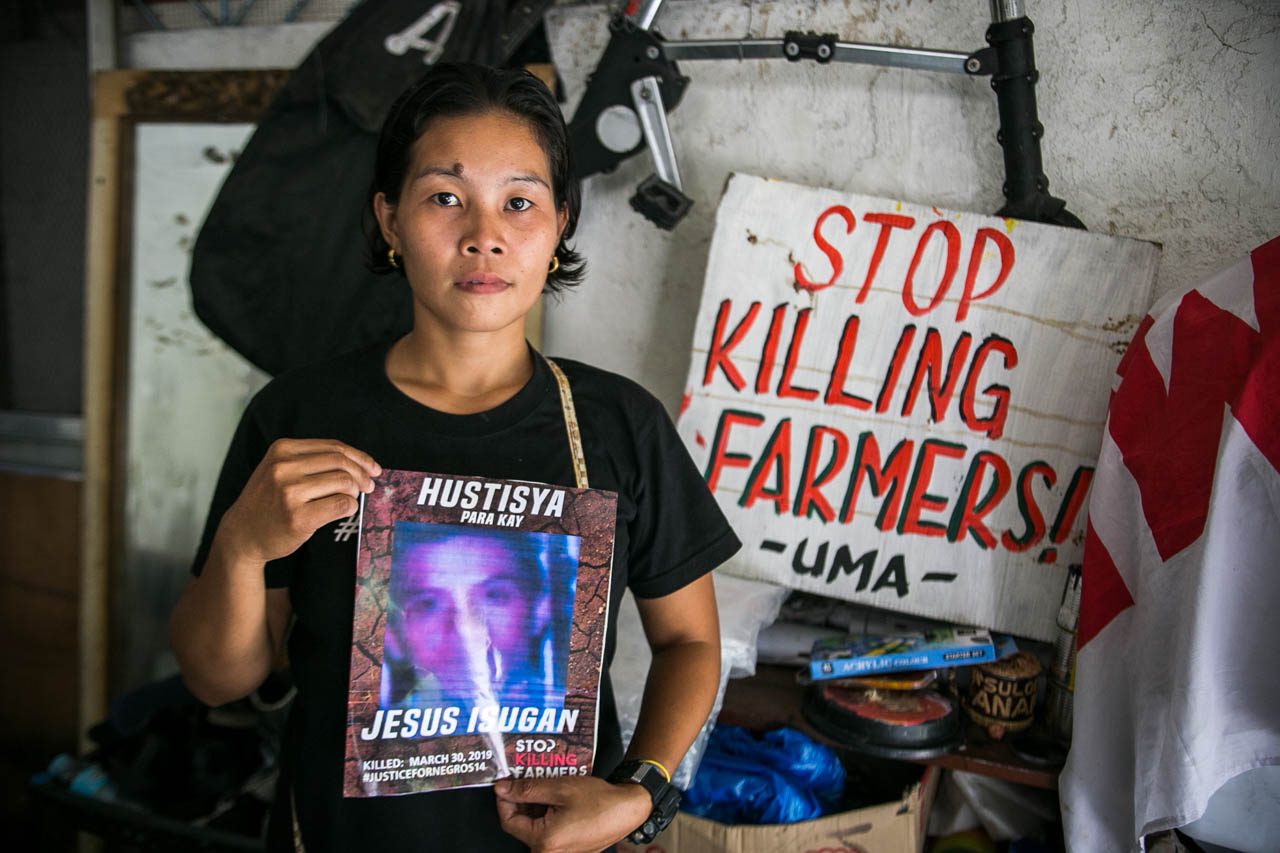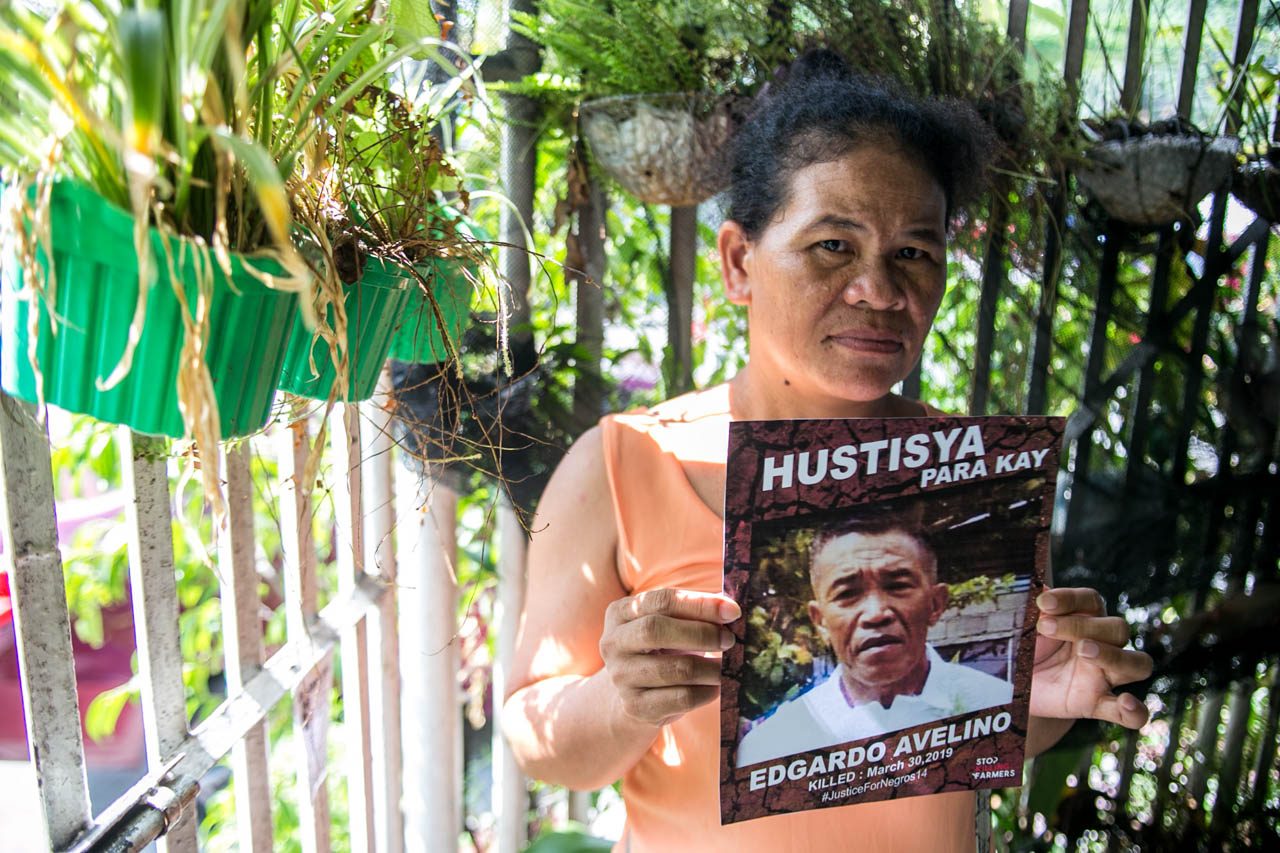SUMMARY
This is AI generated summarization, which may have errors. For context, always refer to the full article.

MANILA, Philippines – Death came two days after a family in Buenavista village in the central Philippine city of Guihulngan, Negros Oriental, celebrated Christmas.
It was 7 am, December 27, 2018, when 3 armed men barged into the house and told them to get out.
Cedine Isugan, 28, was in the kitchen, preparing the day’s first meal. Jesus, her husband, was carrying their 7-month-old son. She was ordered to take the baby from him while he was forced to lie face down at gunpoint. Confused about what was happening, she asked the men, “why us?” They didn’t bother to reply.
“There were dozens of them surrounding the village – all armed and masked. We could only see the print on their shirts that says ‘Police,’” she said.
The armed men dragged Jesus to the backyard while the others talked to the villagers, mostly women and children, who were gathered outside.

“I heard 3 gunshots,” she said. Cedine knew that moment that her husband was in danger, but she was prevented from taking a closer look.
There was a sudden uncontrollable fear in Cedine, and when she was finally allowed to get near her husband, she saw his blood flowing on the barren land. She hesitated to touch his lifeless body – until their two-year-old daughter walked toward her father and innocently tried to wake him up.
“I can’t believe it. It was nothing to them. It was like killing a pig or a stray dog to them,” she said.
“He should’ve not come home,” Cedine said of Jesus.
Second attack
The Isugan home was filled with excitement when Jesus came home for a vacation on December 24, 2018. The next day was a big celebration for the family because it was Jesus’ birthday, which coincided with the Christian observance of Jesus Christ’s birth.
Jesus, a 27-year-old son of a farmer, had worked as a construction laborer in Cebu City for 4 months before he was killed.
The attack against the Isugan family did not end with the death of Jesus. A few weeks ago, their house was burnt down by unidentified assailants.
“They are really angry with us. I think it is because of our family’s involvement in the peasant organization,” said Cedine.
Her parents-in-law are active members of the peasant organization in Negros Oriental that helps farmers with land disputes and unfair labor practices.
Spate of killings
A total of 6 people, including Jesus, were killed that day in December. Their bodies were put in a sack and paraded in front of a police headquarters in Negros.
It was a joint operation of the Armed Forces of the Philippines and the Philippine National Police, called “Oplan Sauron,” against suspected communist rebels, criminals, and those involved in illegal drugs.
According to the police report, some 26 suspects, including 53-year-old Delia Isuga, Jesus’ mother, were arrested. At least 61 firearms, 12 explosives, and hundreds of ammunition were seized. Six people “resisted arrest” and were killed after they “engaged in a shootout” with the law enforcers.
Oplan Sauron was a response of the state forces to President Rodrigo Duterte’s Memorandum Order No. 32, which he signed on November 22, 2018. The order aimed to “suppress lawless violence” in the provinces in Negros, Samar, and Bicol “in order to prevent further loss of innocent lives.”
On March 30, 2019, the second wave of Oplan Sauron claimed the lives of 14 people in 3 towns of Negros Oriental.

Carmela Avelino, 42, recalled how her husband Edgardo, 59, died in the hands of the police in Canlaon City.
It happened before sunrise. “They did not knock. They just entered and woke us up.”
Carmela was sleeping in her daughter’s room while Edgardo was on his favorite cot behind a huge dresser near the door.
“Everyone was shouting. They told us to go out of the house. I ran and chased my daughter, who hurried outside because of fear of the armed men,” she said.
She ran past the cot, but did not see her husband, who was already with the armed men in one of the rooms.
“They told us to go inside the chapel,” she said. “We were so terrified. I was worried because my husband was still inside the house.”
The chapel turned into a temporary holding area for people who were horrified of the sudden influx of armed men in their village.
Carmela kept her eyes to the door of their house, waiting for Edgardo to come out, but he didn’t – until “3 gunshots were fired.”
She asked, “Why? Why my husband?” One of the policemen answered, “Because he is a leader of the communist rebels.”
According to rights group Karapatan, at least 41 people were killed in the Negros provinces from November 2018 to July 28, 2019.
Another group, the Unyon ng Manggagawa sa Agrikultura, has a list of at least 87 who were killed in Negros Oriental and Negros Occidental.
Lawyer Maria Sol Taule of Karapatan claimed that the killings in Negros that involved civilians, rights defenders, activists, and farmers are “all state-sponsored.”
“These killings are part of the intensified campaign against alleged supporters of the revolutionary movement,” she said.
Taule said the method that the state forces are using “is not far from the method that they are using in the government’s anti-narcotics campaign.”
She explained that Duterte’s memorandum order “gave the police and military justification to conduct an illegal search, arrest, and even killing.”
“Then after a series of the so-called legitimate operations, they will use death squads to liquidate more unarmed civilians, mostly peasant leaders and allies of peasant organizations,” she added.
Before Duterte’s memo
The bloodshed that turned Negros Island into a killing field started even before President Duterte issued Memorandum Order No. 32.
Defend Negros Movement recorded at least 84 political killings from 2017 up to this date. Nadja de Vera, convener of the group, said the order “was just issued to legalize the killings.”
“The first victim of the extrajudicial killings in Negros since Duterte came to power was Alexander Ceballos on January 20, 2017,” she said. “After that incident, dozens of civilians, whom in one way or another had supported the plight of the farmers in Negros,” followed, she said.
De Vera said the killings before Duterte’s memorandum order “did not make the headlines because the murders were done one by one on different occasions.”
But on October 20, 2018, Negros Island became the subject of the lens of the media when 9 farmers were killed after they were fired upon by some 40 armed men at Hacienda Nene in Bulanon village in Sagay City, Negros Occidental.
The victims, who were members of the National Federation of Sugar Workers, were workers at the plantation that had been placed under the agrarian reform program but remained in the hands of the owners.
The recent spate of killings from July 23 to 28 in Negros, perpetrated by unidentified armed men, has taken the lives of 14 people, including a one-year-old boy.
July 25 was the bloodiest when 7 civilians were killed.
Philippine National Police chief General Oscar Albayalde on July 26 ordered a thorough and immediate investigation into the series of killings.
National police spokesperson Brigadier General Bernard Banac said they already instructed the regional director “to resolve the series of killings” that they consider “to be crime incidents.”
Church says no
On July 27, the 4 Catholic bishops of Negros Island issued a collegial pastoral statement urging the end to the “unfolding cycle of violence” that is gripping the province.
Bishops Gerardo Alminaza of San Carlos, Julito Cortes of Dumaguete, Patricio Buzon of Bacolod, and Louie Galbines of Kabankalan denounced the “total disregard for the primacy and sanctity of human life.”
“So much blood has already been spilled…. The blood of those killed cries to be heard. It calls out to our basic humanity to be one with those who have been afflicted by this violence,” their statement said.
They also ordered all parishes to “toll the church bells” every evening at 8 o’clock until the killings stop.
“In the stillness of the night, the tolling of the bells signifies our communion as Church. We are to remember those who have gone before us – including those whose lives have been snuffed by these killings – they, who are our brothers and sisters,” the statement added.
The prelates urged the faithful to “pray the Oratio Imperata to end the killings” in the region.
In a separate interview, Bishop Alminaza said that the “killing of another human being especially without due process… is inhumane, immoral, a violation of human right, and a grievous offense against God.”
The prelate said, “It is not for me to say who really are responsible for all the killings…but if it is committed by those entrusted with the sacred duty to defend life and rights, the killing becomes even more abominable.”
He also urged the government to “avoid any militarist strategy” and instead “embrace the pathways to peace” through “socio-economic reforms.”
“Peace cannot be achieved by guns or by killing fellow Filipinos. Once more, we, with the rest of the Filipino people, resonate the call to end the killings and to resume the peace talks,” the prelate added.
On July 23, General Albayalde said, “Since the results [of Oplan Sauron] were good,” it will continue “not just in Negros but throughout the country.”
For Cedine, the “violence” that orphaned her children “will not hinder us from seeking justice.” She admitted that she is afraid, but added that she has “the spirit to continue the fight for the right to life.”
“I will not stop until justice is served. If I couldn’t be there to witness that day to come, I am sure my children will. – Rappler.com
Add a comment
How does this make you feel?
There are no comments yet. Add your comment to start the conversation.